|
Jericho Hill
After a few years we bought another house, on Jericho Hill just outside the village of Alfred, with nine acres and a real barn and chicken coop. All the above activities were continued, and Peg's garden flourished because the former owner had had a thousand chickens and she located her garden in what had been their large outdoor chicken run. Never before or after have we had such prolific vegetable crops as in the first couple of years with Peg's new garden.
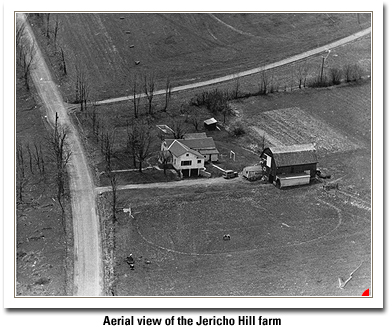
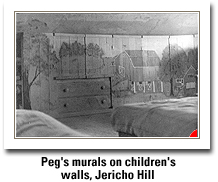 During the college season I was of course fully occupied with my teaching, but there were weekends and holidays when we would do what needed to be done with the house and barn, garden and animals. Peg fixed over the attic and converted it into bedrooms for the children. On the walls she painted murals of landscapes from our own fields and pastures. Various friends have Oh'd and Ah'd about their likeness to the surrounding hills, fields, and woods. In season, she spent hours every day in the garden. She separated the cream from our cow's milk. Many
During the college season I was of course fully occupied with my teaching, but there were weekends and holidays when we would do what needed to be done with the house and barn, garden and animals. Peg fixed over the attic and converted it into bedrooms for the children. On the walls she painted murals of landscapes from our own fields and pastures. Various friends have Oh'd and Ah'd about their likeness to the surrounding hills, fields, and woods. In season, she spent hours every day in the garden. She separated the cream from our cow's milk. Many 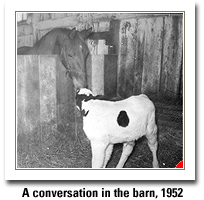 meat dishes got cooked in cream in those days. The meat dishes were all likewise from our own meat, for meantime Peg had acquired a dozen laying hens, and our cow gave birth to a calf each year which we had butchered after a year and a half. And of course there was pork from the pigs: roasts, chops, bacon, sausage - and suet for the birds. We ate royally.
meat dishes got cooked in cream in those days. The meat dishes were all likewise from our own meat, for meantime Peg had acquired a dozen laying hens, and our cow gave birth to a calf each year which we had butchered after a year and a half. And of course there was pork from the pigs: roasts, chops, bacon, sausage - and suet for the birds. We ate royally.
When the cow got dry, we had her bred back by artificial insemination provided by the county agricultural agency. I remember one year that we received a Christmas card with the inscription: "Merry Christmas and Happy New Year -- from your Inseminator. P.S. No service on the holidays."
Peg was an unusually good mother. She was exceptionally active and caring with the children. She would tell them stories, involve them in cooking and other household activities, give them little construction projects, make articles of clothing for them, teach them to read and write, draw and paint, and as time went on, teach them to ride horseback and care for the horses. For a number of years, she organized afternoon tea each day, and we would sit and enjoy cookies and tea and talk with the children.
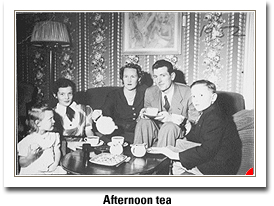
After a few years, the university needed someone to teach two courses in addition to those taught by the full-time German professor. So in addition to all the rest, Peg taught those courses three days a week. One time, when Ursula and David must have been about ten and eight, we had two young black summer vacation children staying with us for two weeks. During that time, Peg was teaching summer school at the university on the first floor of Alumni Hall. The classroom windows were open for fresh air. Suddenly, there were children's voices saying, "Hello, Peg!" Looking in the window were two black faces and two white smiling faces repeating their greetings. The students remembered that, I am sure, long after they had forgotten that mir goes in the Dativ and mich goes in the Akusativ.
I usually went to the annual conference of the American Sociological Association, and also to the regional conference. On one of these sojourns, there was a surprise waiting for me when I got back home. Peg in just four or five days had painted the house red! The house had been white, and we had often talked about getting some barn red paint sometime and painting the house. But little did I imagine! Sure enough, there it was as I drove up the hill from the village - painted barn red with white trim. She had had some help from a student, and the two of them had conspired to surprise me. They sure did.
But it was not surprising that Peg could or would take on something like that. She was full of ideas and full of initiative, and she liked to take matters in her own hands.
By this time, we had a barn full of horses. Peg and I had bought American Saddle Bred horses for ourselves, and ponies for Ursula and David as they grew old enough. Even while we were still at the other house out on West University St. they both had had ponies, and on a Saturday they would take off with them and some sandwiches and be gone along the many dirt roads most of the day. We never worried about them, for they were pretty sensible for kids just seven and nine years old, and of course we knew everybody within a several mile radius, and they knew the children. One day when a storm came up and they were away, we sure enough got a telephone call from a few miles away saying that the ponies were in the barn and the children were in the house.
All summer long, they had sleeping bags and on most nights would sleep out on the grass. In those years we usually had two cats and at least one litter of kittens. In the mornings when we called the two children, we could first see the sleeping bags stirring, and see one or more cats creep out from each sleeping bag.
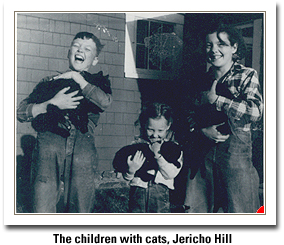
The above about the ponies and sleeping out must have been before 1950, when we moved to Jericho Hill, for it was there that Robin was born in that year. Peg was still teaching German; I do not recall what she did about a baby sitter for Robin.
It was on Jericho Hill that we got interested in horse shows and showing our two five-gaited horses. Ursula and David also did a little showing and racing at the county fair.
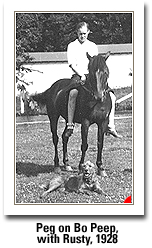 Peg was quite a horsewoman and of course she taught this Brooklyn boy how to ride. We have a nice silver cup that she had won in horsemanship at the age of eight. Now, with all her renewed riding and showing, she started giving riding lessons on the ponies to kids from the village. Meantime, we had the flat field just outside our house and barn converted into a riding ring.
Peg was quite a horsewoman and of course she taught this Brooklyn boy how to ride. We have a nice silver cup that she had won in horsemanship at the age of eight. Now, with all her renewed riding and showing, she started giving riding lessons on the ponies to kids from the village. Meantime, we had the flat field just outside our house and barn converted into a riding ring.
Peg's garden did not quite provide all our vegetables. A few miles away was a huge industrial pea sheller to take care of large farm crops of peas and shell them so they could be shipped off to a frozen vegetable plant (Birdseye, as I recall). It was possible to go there and purchase a peck or bushel or whatever. The local central school (of which she was a school board member) had a canning kitchen with large pressure cookers and other equipment that was open on Saturdays for local people to come and make use of. So for a few years Peg canned (actually not in cans but in jars) an additional supply of vegetables for the table.
Can you imagine what that woman was doing? Here she was processing milk and cream from the cow, growing all our vegetables in her huge garden, taking care of chickens, teaching German at the university, giving riding lessons, managing our four o'clock tea for the whole family, helping muck out stables, helping make maple syrup, and on and on.
But that was not enough for Peg. She ran for the school board and was elected. After a few years she became its chairman. One reason that she was elected was that not only people in the village and the university knew her, but also people out on the farms, many of whom knew her and she knew them personally. She took the school board work very seriously and not only attended the regular formal sessions but did a lot in between. When she was chairman, the principal of Alfred Almond Central School left for a higher level position as school principal in a much larger community. Peg had the chief responsibility for conducting the search for a new principal, with some help from other school board members The effort took much of her time.
All this makes Peg look like a superwoman, or some kind of an angel. Was she all that perfect? No ... just almost. Like all the rest of us, she had her flaws. She was always somewhat shy underneath. Perhaps to compensate, she sometimes took on an authoritarian air, bossing people around, as it were. She liked to keep things steady and dependable, and much of the time she could be counted on to oppose something new. She was utterly frank and honest. If you wanted her opinion, you got it in plain words, even if it was negative; and sometimes you got it even if you didn't want it. This utter honesty could be considered a definite plus, except that at some times a little more deft diplomacy might be preferable. She had fixed ideas, fixed principles, sometimes to the point of obstinacy. She was herself, and not about to act like somebody else.
Perhaps this is the appropriate place to mention one of her other traits ... her sense of humor. As you can read in the final section entitled Peg's Jewels, she still retained that humor even after the onslaught of Alzheimer's. This humor often took the path of teasing. There have been instances where she would tell me something with a straight face, perhaps to correct my pronunciation of a word, and because of her usual basic honesty I would be duped and take it as absolutely true, only to discover much later that she had been teasing.
It was during these years that Peg developed an interest in photography. She purchased an enlarger and arranged a closet for a dark room and went ahead for some years developing the many photos we took and enlarging many of them
How did she do it all, back then? As I sit now by her bedside, I can't for the life of me recall her once complaining that she was doing too many things. I don't even recall being concerned about it, myself.
At that time, the Ag Tech College at Alfred decided to have an equestrian program as part of its athletics offerings. They needed to acquire about ten horses. It was a low-budget enterprise, and so they wanted to shop around for moderate-priced horses, nothing special but in good condition. Peg knew more than anyone in the Alfred area about horses and about how to size horses up for their physical condition. She was the kind who could see a horse a hundred yards away and say, "That horse has been foundered," or "That horse has a bowed tendon." So they asked her to purchase the ten horses for them, which took her several weeks off and on, while she looked at likely horses and tried them out.
The Athletics Department did not have a good horseman to teach the students, so for a number of months Peg gave them riding lessons.
By that time Ursula and David were old enough to help out with chores, mucking out the horse stalls and replenishing the straw. They had already begun milking the cow.
When Ursula was thirteen or so, Peg found a nice chestnut mare for her to ride. By this time Ursula was a fine horsewoman and she enjoyed riding the mare. Along the way, Peg had her own mare bred to a fine American saddle horse stallion and she took pleasure in raising the colt and training it. She called it Slats, although it was registered under the fancy name Highland Dream. So now, Ursula got the idea (no doubt from Peg) that she should have her mare bred, too. So Peg made the arrangements and the mare was bred. It was nearly due to drop the foal in the summer, while the New York State Fair was on at Syracuse. Peg wanted to show her own horse, and so she and Ursula took Peg's horse along to Syracuse. Meantime, we had acquired a four-wheel drive Jeep truck, and I had outfitted it with a strong framework and even stronger tail-gate/ramp as a horse truck. So, we loaded Peg and Ursula and the horse onto the truck and they drove the hundred miles to Syracuse. They were gone two or three days, and at night they slept at the fair in the stall next to Peg's mare. They of course had Peg's riding outfit with them, along with saddle and bridle, halter, brushes, saddle soap, and all the accouterments that go along with showing a horse. I stayed home and kept house and barn while they were away. No sooner did they return with horse and truck than Ursula's mare foaled during the night. Peg once again had the thoroughly delightful job of taking care of the colt's early days, with Ursula working alongside her.
At that time, Peg started learning to play cello, and I started with flute (later, viola). The head of the music department, a German by birth as was his wife, had a portable harpsichord. He played the keyboard, of course, and about once a week they would both come up to our house to play Baroque music with us. His wife was a fine violinist, and so she was also giving Ursula violin lessons. They were very patient with us, for neither of us played too well, having started only in 1952, two years after Robin was born. Ursula and David were eleven and nine, respectively at the time, and in that year Peg and I had begun to learn our instruments at the grand old age of thirty-seven. Soon, we were all heavily involved with music, and Ursula took up the oboe in addition to her violin. Peg and Ursula and I, and later David, played in the university orchestra for several years until we left Alfred.
Peg had gone to high school at George School, a Quaker residence school, and there she became familiar with Quaker beliefs and activities. When Bob and Sue Turner, whom she had known as classmates at George School, moved to Alfred, we got to know them as adults and soon agreed to form a small Quaker worship meeting, along with a few other friends. We joined Quakers and Peg and I were among the founders of Alfred Friends Meeting..
That was in 1952, and the next summer the Meeting took on a large project of gathering volunteers - not only the Quaker members but a score or so from the community - to engage with three potato farmers to help fix up their facilities for migrant workers. Then, as the migrant workers came, we got to know them, visiting the camps during that summer and the following year. Peg and I were especially active in this endeavor.
In the ensuing years until we left Alfred in 1958, Peg for a long time taught First Day School (the name Quakers use for Sunday School), established and gave generously to an Education Fund to be used to help future children of Quaker families to attend Quaker schools, served on various committees of the Meeting, and for a time was its Clerk.
Continue with Stuttgart
Return to My Peg |